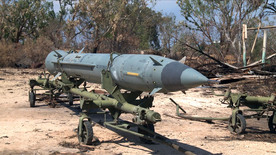THUNDER BAY – The news that Colonel Qadafi has been killed in a gun battle with forces under the leadership of the National Transition Council in Libya mark a turning point in the revolution in the African country.
NATO reports, “It’s easy to see where the oil revenues of Libya were squandered over the decades of Colonel Qadafi’s rule. The streets of the country are now awash with weapons that have fallen into the hands of the National Transitional Council as they seized the caches that were built up to suppress the Libyan people”.
The looting of these weapons hoards allowed the rebels to quickly acquire the firepower they needed to overthrow the regime, but it has resulted in a highly armed population. It is a problem that will need to be addressed quickly if it is not to create security issues further down the line.
Giving up the guns
The situation is serious and there have been calls for the National Transitional Council to act quickly. Recent advertising on Libyan television and radio has encouraged people to hand over their weapons to the authorities.
“It’s started to be like a daily routine where people come and give up their weapons,” says Abed, a member of the National Transitional Council in Abu Sleem. “Before, we had to go to their homes and collect the weapons, now it’s the other way round.”
It is easy to understand why Libyans are not keen to part with the weapons that have taken them through the revolution and thrown off the shackles of a hated despotic regime. Fear and uncertainty in their future has led many to feel that the time has not yet come when they can return to their old lives and put down the tools of war.
“I won’t hand it over until the country is clear and Qadhafi is captured,” says Osama, who used to be a mechanic before the conflict. “When nothing is wrong with the country, I’ll hand over my weapon.”
Others, who have a deeper trust in their new leaders, are ready to follow orders. “Even now if they want me to hand over my weapon I will happily do it, and I will go straight home. I have no problem with this. The most important thing is to have peace and stability in Libya,” says Mahmoud with an assault rifle slung over his shoulder.
The revolutionary without his rifle
One shouldn’t underestimate the power of the image of a man with a Kalashnikov in Libya now. A sense of bravado has built up around it. Before the revolution they may not have come across a weapon unless they were drafted into the army and a lot of young men had only seen guns in the movies.
“You have to be responsible of what you are doing first,” says Ahmed, “I mean holding a gun is not easy. It’s not like ‘oh look at me I’m holding a gun, I’m showing off.’ That’s not it. You’re doing something for your country, you’re supposed to save people, make people safe.”
However, unlike Ahmed, safety is not at the forefront of everybody’s mind. The recent news of the capture of one of Qadhafi’s sons brought people out onto the streets, firing wildly into the air in celebration. Smashed car windshields attest to the inevitable return of the bullets towards earth and there have been reports of injuries and even deaths.
The wrong hands
Whilst Kalashnikov rifles and other small arms such as rocket-propelled grenades have flooded Libya in their hundreds of thousands, there are weapons which although less numerous could cause an even greater threat.
It’s feared that man-portable missiles, rocket systems and even chemical weapons could fall into the hands of extremists unless prompt action is taken to secure them. Individual nations have taken steps to resolve the issue on a bilateral basis. For instance, a recent Canadian initiative saw the government pledge 10m dollars to help Libya collect and neutralise the threat from these weapons systems, while both the UK and the US also acted to deploy military and civilian personnel on the ground to help secure stockpiles.
With the country awash with weaponry, the National Transitional Council will face a tough challenge in disarming their population and creating a safe future for Libya and the region.

